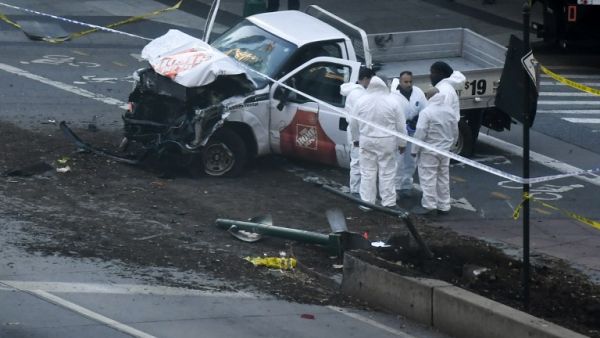- A man who killed eight in New York on Tuesday was heard shouting "Allahu Akbar"
- Media emphasis on the phrase has sparked debate online
- "Allahu Akbar" is used most frequently in prayer, Muslims have pointed out
- Others have highlighted the importance of context for understanding its usage
After eight were killed and 12 injured in a truck ramming in New York on Tuesday, much was made of reports that the assailant had cried “Allahu Akbar.”
The phrase, literally meaning “God is the greatest” in Arabic, was immediately taken by some media outlets to suggest that the attack was an act of terrorism.
At a time when the West is witnessing a sharp rise in Islamophobia, many Muslims were angered by what they saw as the misrepresentation of an important religious term.
Well-known political activist Linda Sarsour was among those to emphasize use of the expression in Muslim prayers.
Every believing Muslim says Allahu Akbar every day during prayers. We cannot criminalize "God is great." Prosecute the criminal not a faith.
— Linda Sarsour (@lsarsour) October 31, 2017
As well as being repeated multiple times during prayer, the call to prayer which sounds out publicly from mosques across the Muslim world five times daily also begins with “Allahu Akbar.”
Sociologist Dr. Craig Considine, whose research focuses on American Muslims and Islamophobia, objected to the automatic connection made between the phrase and terrorism by media outlets.
"Allahu Akbar" is quite literally the term law enforcement agencies & media outlets use to determine whether something is "terrorism." SMH.
— Dr. Craig Considine (@CraigCons) October 31, 2017
When Uzbek immigrant Saifullah Saipov was named as the suspect, Considine also objected to the assumption made by some that his long beard signalled his radical Islamism.
Many Muslims echoed similar sentiments on Twitter.
CNN: We know that Allahu Akbar is a popular phrase among terrorists.
— Rowaida Abdelaziz (@Rowaida_Abdel) October 31, 2017
COME ON MUSLIMS SAY THIS EVERYDAY IN PRAYER.
For the record, "Allahu Akbar" has no inherent political/violent connotation meriting instant terror diagnosis.I say it like 20 times a day.
— rabia chaudry (@rabiasquared) October 31, 2017
Islamophobic incidents in the U.S. increased 65 percent between 2014 and 2016, according to the Council on American-Islamic Relations (CAIR).
Media hysteria over a recent rise in ISIS-linked terror attacks in the West can serve to feed Islamophobia. Victims of hate crimes, for instance, often report their attackers calling them “terrorists” or “ISIS.”
When a hijab or a beard, or simply praying, can put individuals at threat of anti-Muslim violence, it is crucial that the media does not irresponsibly spread fear over ordinary religious practices.
Yet, while ‘Allahu Akbar’ continues to hold an important place in moderate, mainstream Islam, it is also a phrase which has been used by ISIS and other extremist groups as a battle cry.
The perpetrators of multiple attacks with links to terrorist organizations in the West have shouted the expression.
In a series of tweets Rania Khalek, an American journalist of Lebanese descent, emphasized the importance of context when looking at language like “Allahu Akbar.”
What's interesting is how even in the Middle East the phrase Allahu Akbar, depending on the context, provokes resentment, fear, mockery
— Rania Khalek (@RaniaKhalek) November 1, 2017
"Allahu Akbar" has been so coopted, even Muslims in the Middle East mock it. They even made parody videos out of it https://t.co/KuHfUbpnHf
— Rania Khalek (@RaniaKhalek) November 1, 2017
Writer and attorney Wajahat Ali, who was the lead author of “Fear Inc: The Roots of the Islamophobia Network in America,” tweeted that “terrorists also hijack language and faith.”
Allahu Akbar is Arabic for "God is Great." Muslims use it in prayer & as expression of gratitude. Terrorists also hijack language and faith.
— Wajahat Ali (@WajahatAli) October 31, 2017
In this case, the incident is being treated as a terror attack by the authorities. In a tweet, Mayor of New York Bill de Blasio called it a “cowardly act of terror.”
Multiple reports suggest that a note found in the car signalled the attack was carried out in the name of ISIS.
In the context of violent attacks, it seems that “Allahu Akbar” has sometimes been appropriated by extremists. It is perhaps therefore naive to ask the media not to report use of the term by an aggressor as significant.
But that should not undermine attempts by ordinary Muslims to reclaim the phrase, and to spread greater understanding about its various, and mostly positive, usages.
As @MuskieRA tweeted on the matter: “Context is big.”







